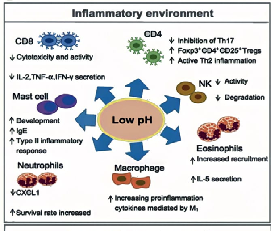The Role of pH in Cancer Biology and its Impact on Cellular Repair, Tumor Markers, Tumor Stages, Isoenzymes, and Therapeutics
Keywords:
Cancer, pH, intracellular alkalization, extracellular acidity, cellular repair, glucosodiene, tumor markersAbstract
The intriguing connection between pH and cancer is explored in this manuscript. The role of pH in cancer biology, including its impact on cellular repair, tumor markers, tumor stages, isoenzymes, and therapies, is highlighted. pH variations can affect cellular repair processes, potentially leading to cancer development. Changes in pH also disrupt various cellular functions, such as enzyme activity and DNA modifications, impacting cancer biology. The acidic tumor microenvironment resulting from pH changes promotes tumor growth and affects surrounding normal tissue. Additionally, pH variations influence specific isoenzymes activity, aiding in cancer diagnosis and targeted therapies. Targeting the pH microenvironment in cancer treatment shows promise, utilizing strategies like pH-sensitive nanoparticles and inhibitors. However, considerations must be made regarding normal cell impact and systemic pH balance. An innovative approach involving a glucose derivative, glucosodiene, inhibits tumor glucose metabolism and restores cellular pH balance. Understanding the intricate relationship between pH and cancer provides insights for diagnostics and treatments. Further research in this field can lead to innovative approaches to combat cancer and improve patient outcomes.
Downloads

Downloads
Published
Issue
Section
License
Copyright (c) 2023 Maher Monir. Akl, Amr Ahmed (Author)

This work is licensed under a Creative Commons Attribution 4.0 International License.
Creative Commons License All articles published in Medicine & Community Health Archives are licensed under a Creative Commons Attribution 4.0 International License.




